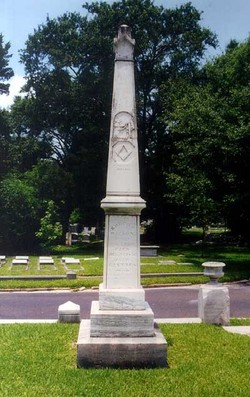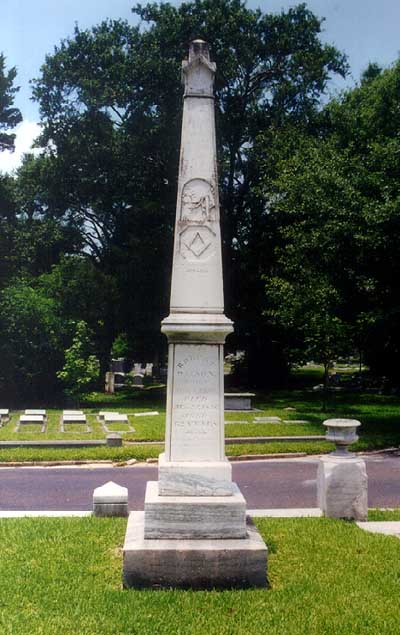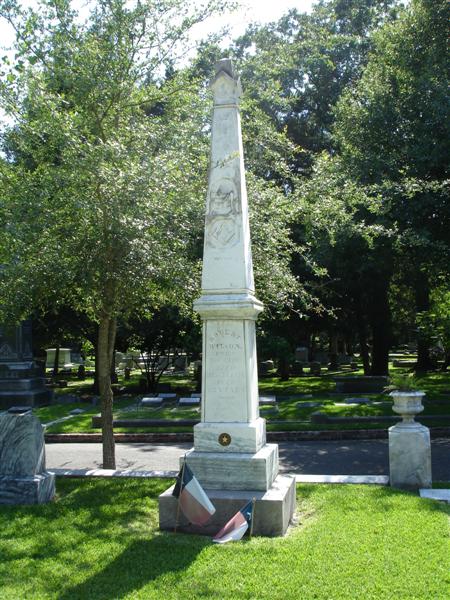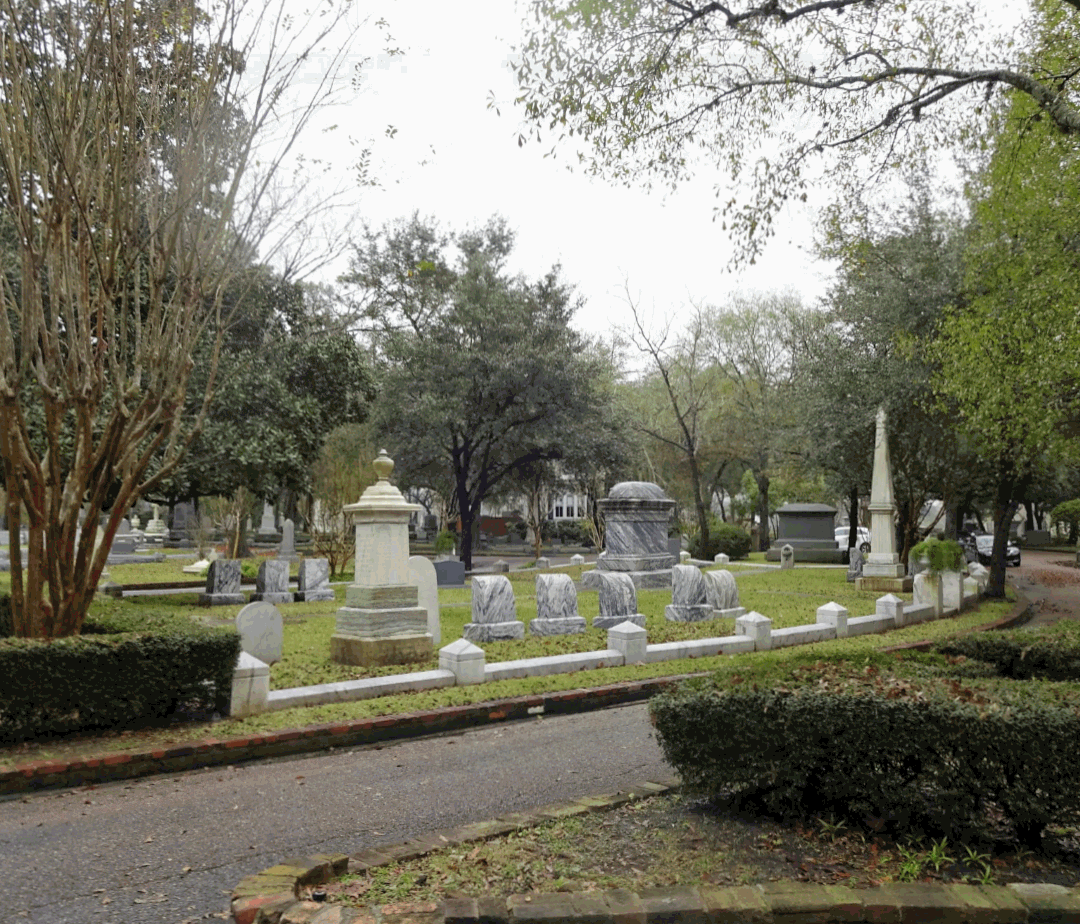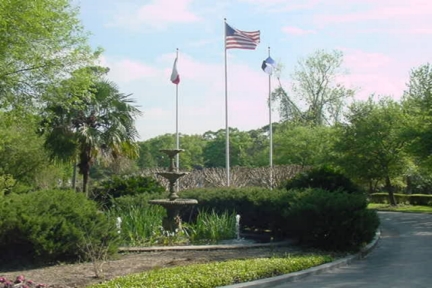~
ROBERT WILSON, the subject of this sketch, a prominent figure in the early history of Texas, and for many years a resident of Houston; was a native of Talbot county, Maryland, where he was born in December, 1793. His parents, James Wilson and Elizabeth, nee Hardcastle, were natives of the same county, and in that general vicinity his ancestors had lived for several generations, having settled there probably in the latter part of the seventeenth century. The stock were Quakers, and came originally from England, and, it is probable, were an offspring of the Quaker colony planted by William Penn.
Robert Wilson was reared in his native place, and enjoyed what might be considered reasonably good educational advantages. He was also taught the trade of carpenter and joiner, learning this in the city of Baltimore. In 1819 he married Margaret Pendergrast, of Baltimore, and the same year emigrated West, and settled in St. Louis, Missouri, where he was engaged for about two years at his trade. He then moved to Natchez, Mississippi, where he became a contractor and builder on a large scale, and accumulated considerable money, erecting buildings for the wealthy planters of the lower Mississippi country. About 1825, he engaged in steamboating, on the Mississippi and Red rivers, at which he also prospered. In 1828 he came to Texas, being attracted hither by the favorable reports he had heard of the country, and the opportunities which he believed it offered to one with some means for investment in industrial pursuits. His attention was probably directed to the Buffalo bayou country, because it lay most contiguous to Austin's colony, and the bayou afforded access by water to the settlements. He brought a schooner, loaded with machinery for a sawmill and gristmill; tools for shops, and provisions of one kind and another suitable for the founding of an industrial enterprise, such as he had in contemplation. He acquired an interest in the ownership of the league of land which had been granted to John R. Harris, lying on the bayou, some five or six miles south of the present site of Houston, on which he located his establishment, and in a few months his place had become the scene of busy activity. His vessels plied along Galveston bay and its estuaries, and up and down the Brazos and Trinity rivers, and visited the gulf ports also as far south as Tampico, Mexico, carrying the products of his mills, which found a ready sale in the several localities indicated, and affording also the means of traffic and transportation in other lines. In response to the demands of the expanding commerce of the colonists, he built, during those years, two custom-houses for the Mexican authorities, one at Galveston and the other at Velasco, and in other ways increased the facilities and strengthened the commercial prosperity of the country.
Mr. Wilson showed an equal interest and zeal in the political welfare of the inhabitants of the country, lending his sympathy and support to them in their early struggles with the Mexican authorities. In 1832, on the seizure and imprisonment of several Americans - among them the afterward distinguished W. B. Travis and P. C. Jack - by the Mexican commander, Bradburn, at Anahuac, he was one of the company of volunteers who rescued them and broke up the garrison at that place. In addition to this he also furnished two vessels, the sloop Mexicana, and the schooner Nelson, which conveyed the Mexican troops out of the country. One of these vessels, the Mexicana, was wrecked during its absence, while yet another, the Josefa, was seized at Velasco by the Mexicans about the same time, neither of which he ever recovered, and for neither of which he ever received any indemnity.
Mr. Wilson volunteered in the Texan army, in 1835, and was present at and took part in the storming of San Antonio, where the gallant Burleson received the surrender of General Cos and his army. He went at once on a mission for the government to New Orleans, where he spent the winter and early spring of 1836 raising men, arms and provisions for the colonists. He met with good success in his efforts in this direction, and in May, 1836, having purchased a Mississippi river steamer, the Ocean, under authority of the provisional government of Texas, he brought what men and supplies he had raised, to Texas, having personal charge of the boats, which he ran into Galveston bay without a pilot. Through all of Texas' struggle for independence he was its steadfast friend and gave freely of his time and resources to further its cause. His devotion to his adopted country was intense, and he testified to it by sacrifices which but few others were called on to make. In addition to his personal services, the expenditure of his means and the loss of his vessels above mentioned, his entire property at Harrisburg, extensive and valuable for that date, was swept away by the fires of Santa Anna's army in its march of devastation just preceding the battle of San Jacinto. On account of this loss, Mr. Wilson, years afterward, when the government had become firmly established and was reimbursing some of its citizens for losses sustained during that period, preferred a claim for indemnity, but he never realized anything out of it, notwithstanding it was endorsed by almost every public man in the State who had been cognizant of the facts, and was fully investigated by the finance committee of the Legislature, which recommended the passage of a bill for his relief. During the time that Mr. Wilson was seeking action on his claim, he received many letters, certificates and testimonials, setting forth the value of his services, the sacrifices he had made, the losses he had sustained and the zeal and devotion he had at all times displayed in the interest of Texas. Many of these communications were the spontaneous offerings of friendship, and now possess a value independently of their connection with his claim. A few extracts from them are given below, as having a bearing upon Mr. Wilson's character and public services.
In 1836, after the battle of San Jacinto, Mr. Wilson turned his attention to the task of straightening out his business and repairing his wasted fortune. He had a large and favorable acquaintance with Texas people, particularly with the members of Austin's colony, and when the Allen brothers, Augustus C. and John K., made their advent on Buffalo bayou, with their plans for a capital for the new Republic, he was sought out by them and interested in their scheme. He conducted the negotiations by which they acquired title to the land, then in the possession of Mr. T F. L. Parrot on which they laid out the town of Houston. For his service in the negotiation of deal, he acquired a one tenth interest in the town ? but disposed of this before it became valuable.
In 1836 Mr. Wilson was elected to the Senate of the Congress of the Republic, which held its first session at Columbia, on the Brazos river, representing the municipality of Harrisburg. While a member of this body, in the spring of 1837, after the seat of government had been removed to Houston, overtures were; made to it by representatives of a bank in Mississippi to lend the new government a million dollars. It came to the knowledge of Mr. Wilson through prominent men whom he had formerly known in Mississippi, that the bank was a "wild-cat" concern and that the movement was simpIy a scheme to defraud the government, and he accordingly opposed it with all the vehemence of his nature. During a secret session of the Senate (from which the obligation of secrecy was subsequently removed), he used language in expressing his feelings on the measure, for which he was reprimanded by the presiding officer, David G. Burnet, and voted expulsion by the house. The affair created great excitement in Houston and in Harrisburg municipality, and .Mr. Wilson, feeling that his honor was in a measure at stake, offered himself for re-election at the special election ordered to fill the vacancy. His opponent was Thomas William Ward, an able and popular gentleman, but such was the confidence of Mr. Wilson's constituents in the correctness of his position and in the honesty of his purposes in opposing the Mississippi bank scheme, that he was returned by an overwhelming vote. Popular enthusiasm over his conduct ran high and it is said by old citizens now living in the city of Houston, which had, in the meantime, become the seat of government, that the scene of a popular demonstration on the occasion of his return to the State house, such as had never before, and has never since, been witnessed in this place. His most enthusiastic followers procured a carriage, from which the horses were taken, and, a long rope being tied to the end of the pole, men and boys to the number of a hundred or more, with several hundred following, pulled it around to where he was staying and, placing him inside hauled him through the streets, knee deep in mud, to the capitol, carried him into the Senate chamber on their shoulders and, placing him in his seat, left him, with the admonition to "stay there." He was subsequently quite generally known as "Honest Bob.'"
Mr. Wilson was identified with the interests of the city of Houston from its founding until his death, and, although not always here, he always considered it his home. He watched the growth of the city and the rise of the Republic with great pride, and contemplated the future of the country, for which he had made such heavy sacrifices, with much satisfaction. He was a warm personal friend of Colonel Stephen F. Austin, and as long as that gentleman lived enjoyed his confidence, holding at times close business and official relations with him. He also knew General Houston well, and numbered this distinguished Texan among his most intimate friends. The following letter, written by General Houston while in the United States Senate, is similar in tone to a number of others from the same gentleman still to be found among Mr. Wilson's papers.
Washington, 8th Feb., 1851.
My Dear Wilson: - I thank you for your favors and will give all the attention to the subject on which you write that is in my power. Gen. Rusk will do likewise. I have but a moment to write. I hope to shake your hand on the 24th inst. in New York.
I am Truly Thy Friend, Sam Houston.
Col. R. Wilson.
On the 25th day of May, 1856, Mr. Wilson, then in the sixty-third year of his age, died. His remains were buried in his private family burying-ground in Houston, and afterward removed to Glenwood, this city. His wife had preceded him many years, having died in 1823, soon after their removal to Natchez, Mississippi. Two sons were born to them: James Theodore Dudley, still a resident of Houston, a sketch of whom appears elsewhere in this work, and John R., who died in Harris county, in January, 1855. Robert Wilson is described by those who remember him, as attractive in person and pleasing in address. He had a hearty, winning way about him, and could probably at one time take as many men by the hand and call them by name as any other man west of the Mississippi river. He was a clear thinker, and strong and forcible talker, and wherever he happened to be he was the center of an admiring group of friends, who listened eagerly to his opinions, and running comments on matters of current interest. In closing a long and friendly letter to him under date of November 12, 1836, General Houston says: "Bob, you talk so well that it is wrong for you to write. I would rather hear your voice than read your letters."
Source: History of Texas Biographical History of the Cities of Houston and Galveston (1895),
~
ROBERT WILSON, the subject of this sketch, a prominent figure in the early history of Texas, and for many years a resident of Houston; was a native of Talbot county, Maryland, where he was born in December, 1793. His parents, James Wilson and Elizabeth, nee Hardcastle, were natives of the same county, and in that general vicinity his ancestors had lived for several generations, having settled there probably in the latter part of the seventeenth century. The stock were Quakers, and came originally from England, and, it is probable, were an offspring of the Quaker colony planted by William Penn.
Robert Wilson was reared in his native place, and enjoyed what might be considered reasonably good educational advantages. He was also taught the trade of carpenter and joiner, learning this in the city of Baltimore. In 1819 he married Margaret Pendergrast, of Baltimore, and the same year emigrated West, and settled in St. Louis, Missouri, where he was engaged for about two years at his trade. He then moved to Natchez, Mississippi, where he became a contractor and builder on a large scale, and accumulated considerable money, erecting buildings for the wealthy planters of the lower Mississippi country. About 1825, he engaged in steamboating, on the Mississippi and Red rivers, at which he also prospered. In 1828 he came to Texas, being attracted hither by the favorable reports he had heard of the country, and the opportunities which he believed it offered to one with some means for investment in industrial pursuits. His attention was probably directed to the Buffalo bayou country, because it lay most contiguous to Austin's colony, and the bayou afforded access by water to the settlements. He brought a schooner, loaded with machinery for a sawmill and gristmill; tools for shops, and provisions of one kind and another suitable for the founding of an industrial enterprise, such as he had in contemplation. He acquired an interest in the ownership of the league of land which had been granted to John R. Harris, lying on the bayou, some five or six miles south of the present site of Houston, on which he located his establishment, and in a few months his place had become the scene of busy activity. His vessels plied along Galveston bay and its estuaries, and up and down the Brazos and Trinity rivers, and visited the gulf ports also as far south as Tampico, Mexico, carrying the products of his mills, which found a ready sale in the several localities indicated, and affording also the means of traffic and transportation in other lines. In response to the demands of the expanding commerce of the colonists, he built, during those years, two custom-houses for the Mexican authorities, one at Galveston and the other at Velasco, and in other ways increased the facilities and strengthened the commercial prosperity of the country.
Mr. Wilson showed an equal interest and zeal in the political welfare of the inhabitants of the country, lending his sympathy and support to them in their early struggles with the Mexican authorities. In 1832, on the seizure and imprisonment of several Americans - among them the afterward distinguished W. B. Travis and P. C. Jack - by the Mexican commander, Bradburn, at Anahuac, he was one of the company of volunteers who rescued them and broke up the garrison at that place. In addition to this he also furnished two vessels, the sloop Mexicana, and the schooner Nelson, which conveyed the Mexican troops out of the country. One of these vessels, the Mexicana, was wrecked during its absence, while yet another, the Josefa, was seized at Velasco by the Mexicans about the same time, neither of which he ever recovered, and for neither of which he ever received any indemnity.
Mr. Wilson volunteered in the Texan army, in 1835, and was present at and took part in the storming of San Antonio, where the gallant Burleson received the surrender of General Cos and his army. He went at once on a mission for the government to New Orleans, where he spent the winter and early spring of 1836 raising men, arms and provisions for the colonists. He met with good success in his efforts in this direction, and in May, 1836, having purchased a Mississippi river steamer, the Ocean, under authority of the provisional government of Texas, he brought what men and supplies he had raised, to Texas, having personal charge of the boats, which he ran into Galveston bay without a pilot. Through all of Texas' struggle for independence he was its steadfast friend and gave freely of his time and resources to further its cause. His devotion to his adopted country was intense, and he testified to it by sacrifices which but few others were called on to make. In addition to his personal services, the expenditure of his means and the loss of his vessels above mentioned, his entire property at Harrisburg, extensive and valuable for that date, was swept away by the fires of Santa Anna's army in its march of devastation just preceding the battle of San Jacinto. On account of this loss, Mr. Wilson, years afterward, when the government had become firmly established and was reimbursing some of its citizens for losses sustained during that period, preferred a claim for indemnity, but he never realized anything out of it, notwithstanding it was endorsed by almost every public man in the State who had been cognizant of the facts, and was fully investigated by the finance committee of the Legislature, which recommended the passage of a bill for his relief. During the time that Mr. Wilson was seeking action on his claim, he received many letters, certificates and testimonials, setting forth the value of his services, the sacrifices he had made, the losses he had sustained and the zeal and devotion he had at all times displayed in the interest of Texas. Many of these communications were the spontaneous offerings of friendship, and now possess a value independently of their connection with his claim. A few extracts from them are given below, as having a bearing upon Mr. Wilson's character and public services.
In 1836, after the battle of San Jacinto, Mr. Wilson turned his attention to the task of straightening out his business and repairing his wasted fortune. He had a large and favorable acquaintance with Texas people, particularly with the members of Austin's colony, and when the Allen brothers, Augustus C. and John K., made their advent on Buffalo bayou, with their plans for a capital for the new Republic, he was sought out by them and interested in their scheme. He conducted the negotiations by which they acquired title to the land, then in the possession of Mr. T F. L. Parrot on which they laid out the town of Houston. For his service in the negotiation of deal, he acquired a one tenth interest in the town ? but disposed of this before it became valuable.
In 1836 Mr. Wilson was elected to the Senate of the Congress of the Republic, which held its first session at Columbia, on the Brazos river, representing the municipality of Harrisburg. While a member of this body, in the spring of 1837, after the seat of government had been removed to Houston, overtures were; made to it by representatives of a bank in Mississippi to lend the new government a million dollars. It came to the knowledge of Mr. Wilson through prominent men whom he had formerly known in Mississippi, that the bank was a "wild-cat" concern and that the movement was simpIy a scheme to defraud the government, and he accordingly opposed it with all the vehemence of his nature. During a secret session of the Senate (from which the obligation of secrecy was subsequently removed), he used language in expressing his feelings on the measure, for which he was reprimanded by the presiding officer, David G. Burnet, and voted expulsion by the house. The affair created great excitement in Houston and in Harrisburg municipality, and .Mr. Wilson, feeling that his honor was in a measure at stake, offered himself for re-election at the special election ordered to fill the vacancy. His opponent was Thomas William Ward, an able and popular gentleman, but such was the confidence of Mr. Wilson's constituents in the correctness of his position and in the honesty of his purposes in opposing the Mississippi bank scheme, that he was returned by an overwhelming vote. Popular enthusiasm over his conduct ran high and it is said by old citizens now living in the city of Houston, which had, in the meantime, become the seat of government, that the scene of a popular demonstration on the occasion of his return to the State house, such as had never before, and has never since, been witnessed in this place. His most enthusiastic followers procured a carriage, from which the horses were taken, and, a long rope being tied to the end of the pole, men and boys to the number of a hundred or more, with several hundred following, pulled it around to where he was staying and, placing him inside hauled him through the streets, knee deep in mud, to the capitol, carried him into the Senate chamber on their shoulders and, placing him in his seat, left him, with the admonition to "stay there." He was subsequently quite generally known as "Honest Bob.'"
Mr. Wilson was identified with the interests of the city of Houston from its founding until his death, and, although not always here, he always considered it his home. He watched the growth of the city and the rise of the Republic with great pride, and contemplated the future of the country, for which he had made such heavy sacrifices, with much satisfaction. He was a warm personal friend of Colonel Stephen F. Austin, and as long as that gentleman lived enjoyed his confidence, holding at times close business and official relations with him. He also knew General Houston well, and numbered this distinguished Texan among his most intimate friends. The following letter, written by General Houston while in the United States Senate, is similar in tone to a number of others from the same gentleman still to be found among Mr. Wilson's papers.
Washington, 8th Feb., 1851.
My Dear Wilson: - I thank you for your favors and will give all the attention to the subject on which you write that is in my power. Gen. Rusk will do likewise. I have but a moment to write. I hope to shake your hand on the 24th inst. in New York.
I am Truly Thy Friend, Sam Houston.
Col. R. Wilson.
On the 25th day of May, 1856, Mr. Wilson, then in the sixty-third year of his age, died. His remains were buried in his private family burying-ground in Houston, and afterward removed to Glenwood, this city. His wife had preceded him many years, having died in 1823, soon after their removal to Natchez, Mississippi. Two sons were born to them: James Theodore Dudley, still a resident of Houston, a sketch of whom appears elsewhere in this work, and John R., who died in Harris county, in January, 1855. Robert Wilson is described by those who remember him, as attractive in person and pleasing in address. He had a hearty, winning way about him, and could probably at one time take as many men by the hand and call them by name as any other man west of the Mississippi river. He was a clear thinker, and strong and forcible talker, and wherever he happened to be he was the center of an admiring group of friends, who listened eagerly to his opinions, and running comments on matters of current interest. In closing a long and friendly letter to him under date of November 12, 1836, General Houston says: "Bob, you talk so well that it is wrong for you to write. I would rather hear your voice than read your letters."
Source: History of Texas Biographical History of the Cities of Houston and Galveston (1895),
Family Members
Advertisement
Advertisement
